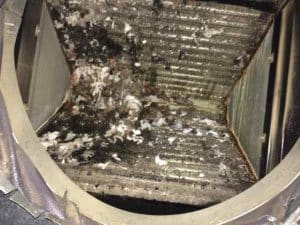Dirty sock syndrome, it that even a thing? To answer the question yes, it is, and yes, it’s unpleasant! You might even be

familiar with it, you just didn’t know it had a name. You know that smell, that dirty, moldy, mildew smell when you turn on your heater or AC? Yes that is what we are talking about, dirty sock syndrome. Dirty sock syndrome is a common HVAC problem. Here’s what you can do about it, and how you can prevent it.
What is Dirty Sock Syndrome?
Dirty sock syndrome occurs when mold and bacteria collect on the evaporator coil. The growth of mold and bacteria make for a “dirty sock” smell when the HVAC system is engaged. Dirty sock syndrome is most common during the Springtime, when people begin to transition from using their heating system to their AC system. The variance in temperature and the moisture created by the condensing unit, mixed with dirt and debris that get trapped make for the perfect breeding ground for dirty sock smelling microbials.
Troubleshooting
When it comes to proper diagnosis of dirty sock syndrome it is important to make sure you rule out other possible culprits.
- Check drainage pans, make sure they are empty and free of any clogs to allow for proper drainage.
- Inspect the air conditioning filter. Make sure it is providing proper filtration for your AC and that it is free from moisture.
- Check drainage lines. Make sure they are free from blockage.
Remember when it comes to HVAC problems it is important to properly diagnose the problem in order to properly find a solution.
Alleviating Dirty Sock Syndrome

To alleviate dirty sock syndrome, you can try cleaning the evaporator coil. However, it is important to note that the microbials could come back. If the problem persists, you may have to replace the coil. As with most things, prevention is the best way to avoid dirty sock syndrome. To prevent microbials from growing on your evaporator coil, you must invest is a good quality air filter. Think of this as a filter for your AC not, you. You may even want to use a UV purifier. These purifiers quickly kill germs and mold that lead to dirty sock syndrome.
Dirty sock syndrome is for the most part harmless. Some people with asthma or compromised immune systems may be more sensitive to the mold and mildew. Routine maintenance is a good way to prevent overgrowth of mold, mildew, and bacteria. Contact Lesco Plumbing, Heating, and Cooling to learn more.
Related Articles







